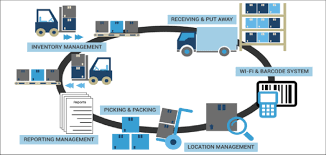6 Min Read


For many of us, the importance of inventory management and supply chain management only ‘hit home’ due to the COVID-19 pandemic.
Of course, even before the onset of this pandemic, inventory management was a vital component of business processes. Without proper control over inventory, businesses will find it impossible to scale up business activities and to meet consumer demand. So, what exactly is meant by inventory management?
What is Inventory Management?

Inventory management is the process of monitoring and controlling inventory levels and is concerned with the entire product life cycle. Essentially, this means that inventory management focuses large segments of business operations, including a businesses’ supply chain, supplier management, warehouse management, and customer satisfaction.
Inventory control and management begin with demand forecasting. Demand forecasting involves estimating how much stock a company should purchase to sell in the future. Without demand forecasting, companies will be buying stock blindly, running the risk of overstocking, understocking, and even stock-outs.
Regarding supply chain and warehouse management, inventory management focuses on ordering the correct amount of stock and organizing it when it arrives at a warehouse. When inventory arrives at a warehouse, each product will be assigned a barcode detailing its location and type. Additionally, an organized warehouse is essential for demand forecasting, as it is impossible to estimate which products are needed without knowledge of stock levels. Once inventory is running low, managers will need to ensure that more stock is ordered on time to meet consumer demand.
Finally, inventory management focuses on customer relationship management and order management. Once customers place an order, a company must ensure that the correct product arrives on time and undamaged. With good order management, your company can build a loyal customer base eager to use your services in the future.
Inventory management is essential for any business, be it small businesses, midsize businesses, large businesses, online retailers, wholesale distributors, or E-commerce businesses. Additionally, inventory control over raw materials is crucial for any manufacturing process to begin. Essentially, a lousy inventory management system can result in lost revenue, loss of customers, and ultimately business shutdown.
With the introduction of inventory software, businesses can monitor inventory levels, stock movements, manage sales, and purchase orders far more efficiently than with traditional methods. In particular, cloud-based inventory management systems are necessary for all inventory management processes. Let’s discuss how cloud-based systems differ from previous inventory management systems.
Smarter Asset Tracking With NFC Tags
Learn more about how NonStop Suite's NFC Asset Tracking Solution can help your Enterprise streamline operations to new heights.
Get A Free Product Tour
Cloud-Based Inventory Management VS Traditional Inventory Management
Inventory management has evolved substantially since the pen and paper method. Before the advent of inventory management and order management software, stock counts and data entry was completed by a company manually. This process, however, was prone to human error, cumbersome, and slow. In addition, sharing data is difficult and inefficient if a business operates in multiple locations.
Among the first technological solutions integrated within an inventory management system were the use of barcodes and radio frequency identification (RFID). While barcodes saw an improvement in inventory management, inventory data was still manually inputted. Additionally, hardware and software updates would be regularly needed should a business scale up.
However, inventory management with cloud-based software is very different from both the pen & paper method and earlier technological solutions. Cloud-based systems ensure easy access for users with any internet-connected device. Therefore, cloud solutions enable data to be shared quickly between multiple users, unlike the traditional method, where this was difficult. Mobile access also means that any problem in the inventory process can be handled quickly.
With cloud-based software, the entire inventory management process is controlled and monitored with mobile devices, thereby giving businesses complete control over the inventory process. Essentially, cloud-based solutions centralize and integrate every aspect of inventory management to make it more efficient and productive. We will discuss the benefits of cloud software for inventory management will be addressed soon!
Moreover, your company need not worry about costly hardware and software updates with cloud inventory management! As companies purchase software packages from software vendors, expensive hardware and software purchases are not needed! Your company can purchase a software package depending on your requirements. For example, a company can buy accounting software specifically for its accounting system. Additionally, maintenance costs are low as any updates and maintenance to servers will be executed by vendors or software companies.
Besides cloud software systems, businesses can use other types of inventory management software to aid business processes. Let’s discuss these different types in more depth.
What are Different Types of Inventory Management Software?

Besides cloud solutions, an example of inventory management software is ‘on-premise’ software solutions. Unlike cloud software, which is purchased from vendors and updated by the same vendors, on-premise software solutions are installed and updated on a businesses’ servers and computers.
For a small or midsize business, periodic inventory systems will suit their needs. With a periodic system, stock counts are conducted at set periods; the counted stock is then compared to the recorded sales orders and purchases.
As discussed earlier, barcodes are an example of inventory management software that continues to be essential for businesses, as they enable easy inventory tracking and asset tracking. We have already mentioned the use of RFID. While it eliminated the need for manual input by staff, it tends to be an expensive solution.
Best Cloud Inventory Management Software
Below is a list of the best inventory management software. Ultimately, the cloud based system you select must meet the needs of your business.

NonStop Suite
Unleashed
Lightspeed Retail
Quickbooks
Zoho
Veeqo
Significance of Cloud-Based Inventory Management Systems
A cloud-based inventory management system brings enormous benefits for businesses which use them. Let’s discuss some of these benefits and key features now.
Error Reduction
A significant drawback of traditional inventory management methods was the tendency for errors to arise during stock counts. Cloud inventory management software lets your company automate tasks to ensure these errors are reduced and ensure accurate inventory reporting. For example, once a customer has purchased a product, the inventory count will be automatically updated, therefore reducing human error in the inventory management process.
Errors could also arise due to poor order management. For example, a company’s website could incorrectly show a product to be in stock, or a customer could receive the wrong order. Additionally, billing errors can also result from the traditional method, leading to frustration for both employees and customers. Cloud software automates and streamlines the entire order management process and efficiently manages sales channels to prevent these errors. In addition, as a cloud system automatically updates inventory levels, customers will never purchase out-of-stock items.
A cloud-based inventory system can also assist with demand and sales forecasting. This means that companies can mitigate the risks of stocking excess inventory and not having enough stock. Additionally, you can automate reorder points for selected products, guaranteeing that your business will never run low on critical inventory!
Enhances Productivity
While inventory management is essential for business success, it is a cumbersome process that occupies valuable employee time. As cloud management systems automate vital components of inventory management, such as stock counts, order management, and the inventory database, employees can spend their time more fruitfully. With enhanced productivity, companies can increase their profit margins further.
Fully Scalable With Real-time Visibility
Unlike on-premise solutions, businesses will not need to purchase expensive hardware or software. Instead, cloud software can be used on any device with an internet connection. Thus, should companies need to scale up their operations, they can do so quickly and not be constrained by expensive hardware or software purchases.
Real-time product inventory visibility is among the critical features of cloud-based systems. Gaining a real-time view of your stock can help decision-making and maintain inventory at an optimal level to guarantee customer satisfaction. Additionally, with information stored on a centralized database, employees will not have to rely on manual reporting techniques or wait for details on current stock levels.
Adds to Customer Satisfaction
With cloud inventory management systems, many essential components of order management are automated. Automated features include processing a customers’ purchase order and customer billing. Additionally, your business can process more orders, purchase stock at the correct time, and ship products quicker with cloud inventory systems. All of this results in customers receiving their orders faster. In turn, your business creates a loyal customer base eager to use your services in the future!
Seamless Product Management
With a cloud-based inventory system, every step of the inventory management process is accessible from your fingertips, whether in the office or on the warehouse floor. You can monitor any stock level to ensure that no product is out of stock or that too much inventory has been purchased.
Companies can also use a cloud-based inventory system to track inventory as it moves from your suppliers to your warehouse and finally to your customers (in the case of Ecommerce companies). Inventory tracking is incredibly convenient for companies that use multiple warehouses. As inventory moves between warehouses, the inventory level at both warehouses is automatically updated. Moreover, with each product being assigned a barcode, the inventory count will also automatically update once it has been sold to a customer. Additionally, cloud-based solutions offer demand forecasting features, meaning that companies can eliminate storage and warehousing costs by not ordering excessive inventory. As can be seen, every stage of the inventory management process is enhanced through the use of cloud-based solutions.
Cloud-based software can also be integrated with multiple channels, such as sales channels and order channels, giving you a complete overview of current stock levels. As cloud-based management systems integrate every component of inventory management, your company will have access to every detail of your inventory. These details include how much inventory is being sold, when more has to be ordered, and where it is being stored. With these sorts of features offered, cloud-based management systems are vital for improving overall business performance.
Data Protection
While most of us are rightly concerned about online safety, cloud-based management solutions are safe for businesses to use and will get maximum security when using them. Data is automatically updated, and it is always backed up. This is convenient should a business lose valuable data due to accidental deletion or file corruption.
Additionally, vendors will ensure your data is well protected through regular updates. Because of the recovery options that cloud-based solutions have, your data is more secure here than it would be on your hard drive or own computer.
Who Needs a Cloud Inventory Management Software?
We mentioned earlier that businesses of all sizes can use a cloud inventory management system for accurate reporting and efficient inventory tracking. This includes small businesses, midsize businesses, Ecommerce businesses, online retail stores, and large businesses. Manufacturing businesses can also take advantage of cloud-based solutions, as they are helpful for both production planning and capacity planning.

